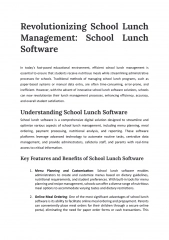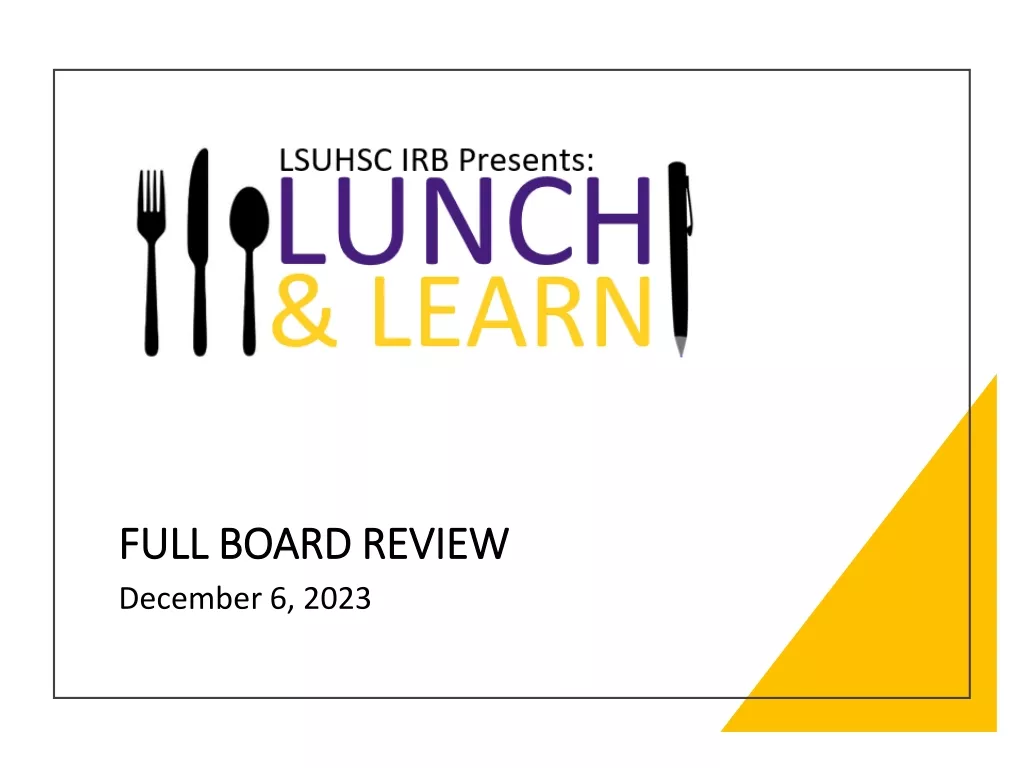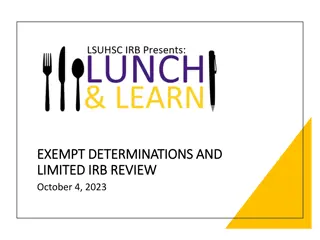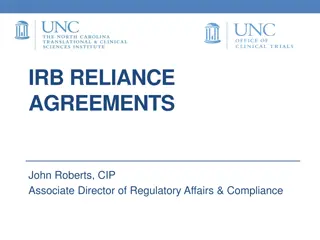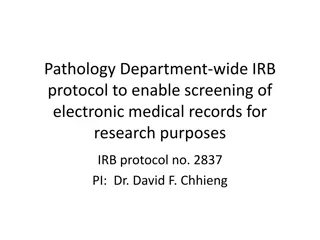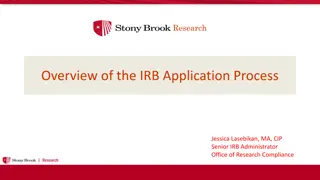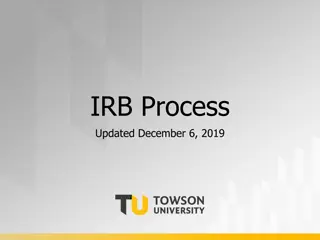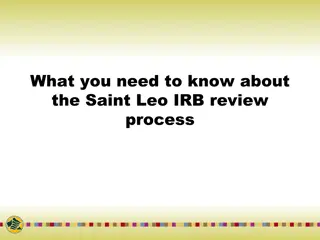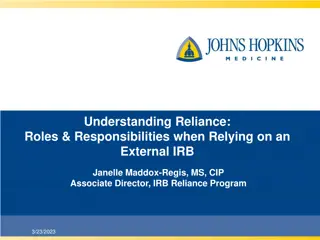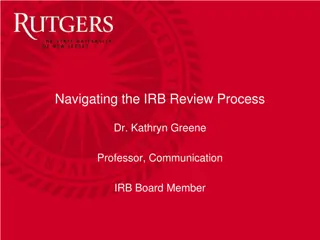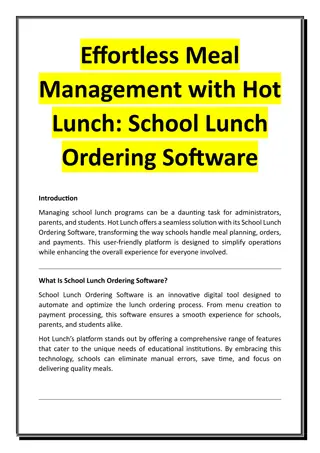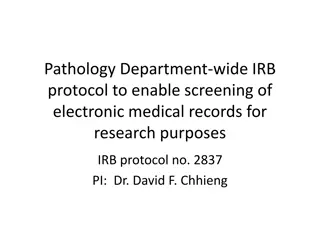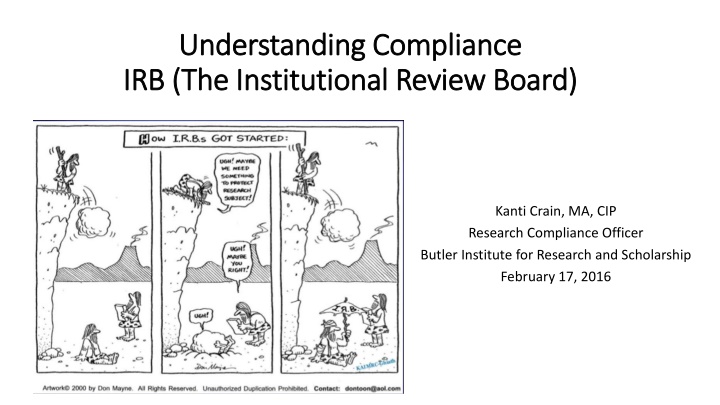
Understanding Research Compliance: IRB Review and Human Subjects
Explore the role of Institutional Review Boards (IRBs) in research compliance, the criteria for IRB review, and the involvement of human subjects in research activities to ensure adherence to regulations and policies.
Download Presentation

Please find below an Image/Link to download the presentation.
The content on the website is provided AS IS for your information and personal use only. It may not be sold, licensed, or shared on other websites without obtaining consent from the author. If you encounter any issues during the download, it is possible that the publisher has removed the file from their server.
You are allowed to download the files provided on this website for personal or commercial use, subject to the condition that they are used lawfully. All files are the property of their respective owners.
The content on the website is provided AS IS for your information and personal use only. It may not be sold, licensed, or shared on other websites without obtaining consent from the author.
E N D
Presentation Transcript
Understanding Compliance Understanding Compliance IRB (The Institutional Review Board) IRB (The Institutional Review Board) Kanti Crain, MA, CIP Research Compliance Officer Butler Institute for Research and Scholarship February 17, 2016
5 5 Cs C s Clean Clean Clear Complete Consistent Compliant Clear Consistent Complete Compliance
Research Compliance Research Compliance Ensure that research activities are in compliance with the federal regulations, state law and the institution's policy. IRB (Institutional Review Board) IACUC (Institutional Animal Care and Use Committee) responsible for oversight of activities involving animal care and use IBC (Institutional Biosafety Committee) responsible for oversight of activities involving rDNA and Biohazards
IRB (Institutional Review Board) IRB (Institutional Review Board) Any Board formally designed by an institution to review, to approve the ignition of, and to conduct periodic review of research involving human subjects. The primary purpose of such review is to assure the protection of the rights and welfare of the human subjects. http://www.hhs.gov/ohrp/humansubjects/guidance/belmont.html http://www.hhs.gov/ohrp/humansubjects/guidance/45cfr46.html
What requires IRB Review? What requires IRB Review? Exempt Expedited Does it require IRB review/ approval? Depends on the risks What Level? Yes Full Board Cooperative
What requires IRB Review? What requires IRB Review? Continued Continued
Is it Research? Does it involve Human Subjects a systematic investigation, including research development, testing and evaluation, designed to develop or contribute to generalizable knowledge Systematic investigation: An activity that is planned in advance and that uses data collection and analysis to answer a question Generalizable knowledge: Information that expands the knowledge base of a scientific discipline or other scholarly field of study A living individual about whom an investigator conducting research obtains (1) data through intervention or interaction with the individual; or (2) identifiable private information. Living individual - The specimen(s)/data/information must be collected from live subjects. "About whom" - the data is received from the living individual is about the person. ----------------------- Intervention - physical/psychological procedures, manipulations of the subject, or manipulations of the subject's environment for research purposes. Interaction - communication between the investigator and the subject. This includes face-to-face, mail, and phone interaction as well as any other mode of communication. ----------------------- Identifiable private information - the information that can be used to identify the individual
Examples: Examples: Human Subjects Research Non- Human Subjects Research Survey, interview, and/ or focus group for a thesis purpose Students chart review when the investigators have access to the identifiers. Quality Improvement Program only for internal purpose Class project that only will be presented in a class Project about deceased individuals Biography or oral history Please note: Some funded projects are still required to obtain the IRB approval due to the Sponsor s request. It s a common scenario for the Federal funded projects.
Exempt Expedited Full Board Cooperative Review Greater than minimal risk Minimal risk but doesn't qualify for Exempt or Expedited Level of Risks Less than Minimal Risk Not greater than Minimal Risk Depends on the accredited IRB reviewing protocol Category of Review Fall into at least one of 6 categories http://www.hhs.gov/ohrp/humansubjects /guidance/45cfr46.html#46.101 Fall into at least one of 9 categories http://www.hhs.gov/ohrp/policy/expe dited98.html Full Board Depends on the accredited IRB reviewing protocol Form Application for Exemption of a Project Involving Human Subjects IRB Application for Expedited Approval or Full Approval IRB Application for Expedited Approval or Full Approval Application Form for Accepting Approval of another Institution's IRB Regulations do not apply, however ethics apply Chair and/or 1 reviewer Regulations apply Chair and 1 Reviewer Regulations apply Convened Meeting (Ad Hoc basis) Review Process Administratively Accepted/ filed by BIRS Chart review with the identifier Survey, focus group, and interview with minors Survey, interview that collect identifier and might put subjects at risk of criminal or civil liability or be damaging their employable or reputation. Examples Education Research Surveys, Interviews, Educational Tests, Public Observations (that do not involve children) Analysis of Previously-Collected, Anonymous Data Randomized drug study Research conducted at Methodist Hospital
Cooperative Cooperative Research Research Review Review What is Cooperative Research Review? Procedure for Accepting Approval of Another Institution's IRB to eliminate duplicative IRB review efforts What are the criteria? The researcher has submitted, as an investigator, a protocol to another qualified IRB (i.e., one that has a current Federal Wide Assurance with OHRP) or the researcher has been asked to join an ongoing research project where approval has already been obtained from another qualified IRB; A Butler University faculty member, employee, or student is a participating researcher in the project; and The research will be conducted entirely at another institution, or Butler University is listed as a site on the approved application. What are the required documents: A completed, signed Application Form for Accepting Approval from Another IRB Documentation establishing that the institution whose IRB approves the protocol has a current Federal Wide Assurance with OHRP; A copy of the protocol approved by the qualified IRB; and A copy of the letter of approval from the other institution's IRB.
IRB Flowchart IRB Flowchart Pre Review Submission Continuing Review/Renewal/ Close out Post Approval Review Amendment Non Compliance/ Prompt Report Approval
Submissions Submissions Investigators Requirements Only Faculty and Staff are eligible to serve as a Principle Investigator (PI) All investigators must complete the proper Collaborative Institutional Training Initiative (CITI) Training. o The training is valid for 3 years. So, refresher courses must be taken every three years. Biomedical faculty - staff Social Behavior faculty Staff Student Researchers o The expiration notifications are sent 2 months, 1 month and 1 week before the expiration date o How about non-affiliated Investigator? Please complete the faculty staff courses o What if I have a CITI account in my previous institution? Please add Butler to your profile. You will be given credit for your previous courses to the extent they overlap with Butler's requirements.
Submissions Requirements Please apply 5 C s to the following: Signed Application Form (electronic or ink signature) CITI Training All applicable supporting documents e.g. consent, flyer, recruitment email, survey, interview guide, permission/ approval documentation from the site, children form, SONA announcement etc. Forms & Templates http://legacy.butler.edu/research-scholarship/compliance/review- board/application-forms/ Submit to IRB@Butler.edu or JH 109 Room D
Pre Review & Review Pre Review & Review Pre Review Research Compliance Officer (RCO) will perform the Pre review based on the 5 C s Get back to the investigators in 24-48 hours Either I will ask for clarification or I will inform you that the submission has been sent to the IRB for the final Review For the Expedited review, the RCO analyzes the Expedited category and present it to the reviewers. Timeline No timeline set yet, I d submit the application 30 days prior your research initiation. Criteria of Approval 1. The risks to subjects are minimized as much as possible. 2. The risks to subjects are reasonable in relation to anticipated benefits. 3. Selection of subjects is equitable. 4. The informed consent is adequate. 5. Where appropriate, the research plan makes provisions for the safety of the subjects during the data collection process. 6. Where appropriate, there are adequate provisions to protect the privacy of subjects and maintain confidentiality of data. 7. Appropriate safeguards are included within the study to protect the rights and welfare of the vulnerable subjects.
Approval Approval The approval letter will be issued by BIRS Director Approval email will include the approval letter, approved application form and approved supporting documents. Exemptions does not expire. Non Exemptions will expire in one year. Unfortunately, our office does not have any mechanism in sending our the expiration notification
Post Approval Post Approval Amendment Email the irb@butler.edu the following information: Principle Investigator s name, title, the student researcher The proposed changes The justification of the changes The updated documents Renewal (Continuing Review) and Close out Please complete the continuing review/ close out form available on http://legacy.butler.edu/research- scholarship/compliance/review-board/application-forms/ and email to irb@butler.edu Non Compliance and Prompt Report Email the irb@butler.edu the following information: Principle Investigator s name, title, the student researcher Description of the non compliance/prompt report Documents Retention After a research protocol is closed, terminated, or has expired, the physical IRB study file will be kept for a period of three (3) years following closure, termination, or expiration of IRB approval. For studies involving individually identifiable health information (e.g., medical records),HIPAA (Health Insurance Portability and Accountability Act) requires that supporting documentation be kept for at least six (6) years, whereas Indiana state law requires that supporting documentation be kept for at least seven (7) years.
Whats new? What s new? Updated SOP It s available on http://legacy.butler.edu/research- scholarship/compliance/review-board/irb-policies-and-procedures/ Pre Review Process Children Form Any non-Exempt application that involves children (subjects under 18 years old) needs to submit the Children Form to determine the risk of the children involvements in the research. This form is available http://legacy.butler.edu/research-scholarship/compliance/review- board/application-forms/ New consent and assent template The forms are available http://legacy.butler.edu/research- scholarship/compliance/review-board/application-forms/ Please note: If your research involves video/audio recording, please ensure to have a separate signature line on the assent/consent to ask the subjects permission whether they allow this procedure. This BU policy is in place because recording (audio or video) presents a separate level of risk that participants should agree to (or refuse) separately from other data they provide. If it is not possible to participate unless subjects are recorded, this needs to be clearly stated and, again, separately consented to.
Whats new What s new? ? Continued Continued FERPA (Family Educational Rights and Privacy Act (FERPA) Any research that involves students records may need to apply FERPA rules. It is a federal law that protects the privacy of student education records. The law applies to all schools that receive funds under an applicable program of the U.S. Department of Education. o Does FERPA apply to the school? o If yes, who will have access to the identifiable students records? o FERPA does not allow a passive consent when the identifiable information from students' education records are released/ accessed. Education records include (not limited to) graded papers, exams, class roasters, note from conversation with a student etc. o Current practice: FERPA allows access to Education Records for Research Purposes Without Obtaining Active consent if the research meets at least one of this criteria: Disclosure of Directory Information Disclosure of Education Records Without Personally Identifiable Information (PII) School Officials with Legitimate Educational Interest Studies to Develop, Validate, or Administer Predictive Tests; Administer Student Aid Programs; or Improve Instruction on behalf of educational agencies or institution
Whats new What s new? ? Continued Continued Anonymity Vs. Confidentiality Anonymity: Assurance that no one, not even the researcher, knows whose responses have been recorded in a study. Confidentiality: Assurance that only the researcher knows who belongs to the data; that a third party who somehow gained access to the data would not be able to make a link between the subject and the data recorded from that subject. The IRB is particularly interested if you plan to keep subject identifiers (name, telephone number or student ID, patient chart number, etc.) on data collection forms (such as the survey instrument), and if so, why it is necessary. If identifiers are maintained and links to the subject can be made, then the IRB is interested in how you plan to store the data to ensure that a third party could not have access to the data.
Questions? Ideas? Comments
Next Sessions Next Sessions Understanding Compliance - IBC for faculty and staff, Feb 22, noon- 1pm, AU111 Understanding Compliance - IRB for students, March 4, noon- 1pm, JH083

